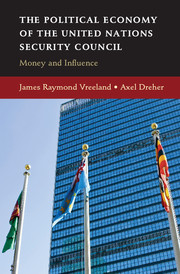Book contents
- Frontmatter
- Contents
- Figures
- Tables
- Acknowledgments
- 1 Money and Politics on the International Stage
- 2 A Theory of Trading Security Council Votes for Aid
- 3 Examples of Punishments, Threats, and Rewards
- 4 Who Wins Election to Represent the World?
- 5 Statistical Evidence of Trading Finance for Favors
- 6 Consequences of Politically Motivated Aid
- 7 Reforming the UNSC
- References
- Author Index
- Subject Index
5 - Statistical Evidence of Trading Finance for Favors
Published online by Cambridge University Press: 05 June 2014
- Frontmatter
- Contents
- Figures
- Tables
- Acknowledgments
- 1 Money and Politics on the International Stage
- 2 A Theory of Trading Security Council Votes for Aid
- 3 Examples of Punishments, Threats, and Rewards
- 4 Who Wins Election to Represent the World?
- 5 Statistical Evidence of Trading Finance for Favors
- 6 Consequences of Politically Motivated Aid
- 7 Reforming the UNSC
- References
- Author Index
- Subject Index
Summary
Introduction
Do elected UN Security Council members receive perks during their terms? This empirical question constitutes the central concern of this book. Confronting it with quantitative data embodies the task of this chapter. Having presented many examples in Chapter 3, we now seek to test whether the examples represent exceptional cases or, instead, are part of a systematic pattern – and we must do so while remaining mindful of potential selection bias, as discussed in Chapter 4.
We begin our inquiry into the effects of UNSC membership with an examination of bilateral foreign aid. We then examine whether countries trade money for influence through multilateral organizations. Specifically, we consider the IMF, the World Bank, the United Nations, and regional development banks (RDBs). Finally, we address the more nuanced hypothesis of whether donor countries target swing voters on the UNSC.
Background on Bilateral Aid: The United States, Japan, Germany, the United Kingdom, and France
Throughout the history of the UNSC, the United States has served as the most prominent agenda-setter. Qualitative examples concerning the United States abound and thus fill the pages of Chapter 3. The focus of our quantitative analysis below begins, therefore, with the United States. We follow Kuziemko and Werker (2006), who show that the United States increases bilateral aid to UNSC members, specifically during important years when the Security Council receives heightened media attention.
- Type
- Chapter
- Information
- The Political Economy of the United Nations Security CouncilMoney and Influence, pp. 137 - 187Publisher: Cambridge University PressPrint publication year: 2014



